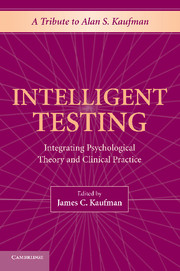Book contents
- Frontmatter
- Contents
- Acknowledgments
- Alphabetical List of Authors and Affiliations
- PART ONE THOSE WHO KNOW HIM
- PART TWO INTELLIGENT TESTING
- PART THREE THE INTERSECTION OF THEORY AND MEASUREMENT
- PART FOUR KAUFMAN ACROSS THE WORLD
- 12 The K-ABC in France
- 13 Dr. Alan Kaufman's Contribution to Japan: K-ABC, Intelligent Testing, and School Psychology
- 14 Alan Kaufman's Deep Influence in Sweden
- 15 Intelligent Testing of Underserved Populations
- 16 Alan S. Kaufman: The Effects of One Man's Extraordinary Vision
- Author Index
- Subject Index
- References
15 - Intelligent Testing of Underserved Populations
Published online by Cambridge University Press: 05 August 2012
- Frontmatter
- Contents
- Acknowledgments
- Alphabetical List of Authors and Affiliations
- PART ONE THOSE WHO KNOW HIM
- PART TWO INTELLIGENT TESTING
- PART THREE THE INTERSECTION OF THEORY AND MEASUREMENT
- PART FOUR KAUFMAN ACROSS THE WORLD
- 12 The K-ABC in France
- 13 Dr. Alan Kaufman's Contribution to Japan: K-ABC, Intelligent Testing, and School Psychology
- 14 Alan Kaufman's Deep Influence in Sweden
- 15 Intelligent Testing of Underserved Populations
- 16 Alan S. Kaufman: The Effects of One Man's Extraordinary Vision
- Author Index
- Subject Index
- References
Summary
INTELLIGENT TESTING OF UNDERSERVED POPULATIONS
The imperative for nonverbal assessment in the United States is obvious and growing. According to U.S. Census data reported in 2000, more than 31 million people 5 years and older spoke a language other than English in the home and almost 2,000,000 had no English-speaking ability (U.S. Bureau of the Census). By 2005 the number of individuals who speak a language other than English in their homes had increased to nearly 60 million (approximately 20 percent of the U.S. population). In the United States, 12 individual states report that 20 percent or more of their respective populations speak a language other than English. California was the state that reported the largest percentage of non-English speakers (42.3 percent); Puerto Rico was the American territory reporting the largest incidence of non-English speakers (95.4 percent) (http://factfinder.census.gov/home/saff/main.html).
Minority children and children from non-White racial or ethnic backgrounds comprise an increasingly larger percentage of public school children, particularly in many large metropolitan areas. For example, minority students comprise an overwhelming percentage of the school population in Miami (approximately 84 percent), Chicago (89 percent), and Houston (88 percent) (Bracken & McCallum, in press) Many of these minority children speak languages other than English, with the Limited English Proficient (LEP) population representing the fastest growing segment of the population in the United States.
Information
- Type
- Chapter
- Information
- Intelligent TestingIntegrating Psychological Theory and Clinical Practice, pp. 193 - 219Publisher: Cambridge University PressPrint publication year: 2009
